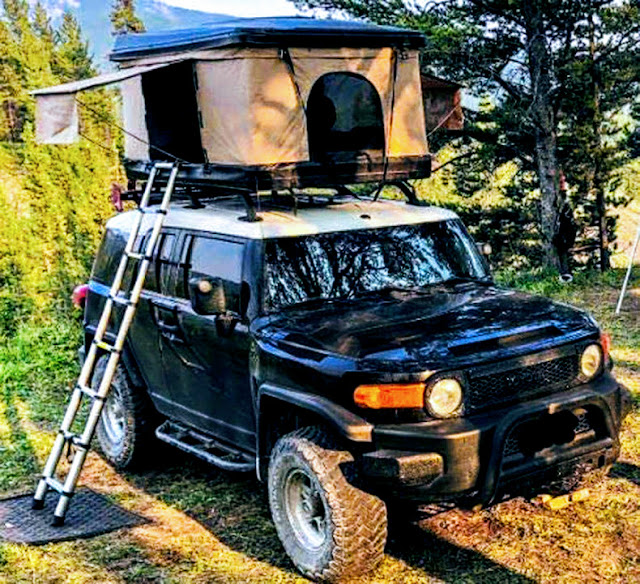 |
| Amazon Image |
Made famous by Instagram, roof top tents have recently surged in popularity, leading top outdoor brands such as Yakima to begin expanding their offerings into the roof-tent arena.
Roof top tens are cool, and make your car look like it belongs to a bad-ass adventure seeker, wanderer, off-grid rebel, or a digital nomad.
While definitely practical, and cool, roof top tents have their own advantages, and disadvantages.
Here are a few questions to ask yourself before even considering buying a roof top tent :
What type of camping do you do ?
Rooftop tents have their origins in the African bush and Australian Outback, where they gave people a safe place to sleep and to avoid entanglements with everything from lions and tigers to poisonous snakes and spiders. However, in North America we seldom see those kinds of dangers while camping. Most American national parks have few major predators, and it's very rare when we encounter them while staying in designated camping areas.
So, the question is : if you only camp at campgrounds, do you really need a roof top tent ?
What type of car do you drive ?
When I just got into car camping, I either slept in a tent on the ground, or inside my SUV.
But later, when my son was born, and we started getting in different outdoor activities, I needed more space for both of us, and our gear.
Ask yourself - do I really need a rooftop tent, or can I just sleep in the my car/tent on the ground ?
What type of roof top tent do I need ?
There are hard shell roof top tents and soft top ones :
Hard-shell roof tents are generally made from fiberglass with synthetic siding. These are the sleek tents you may have seen on Instagram—they fold down into a compact, (relatively) aerodynamic rectangle and start at around $2,600. All the models we researched had shredded-memory-foam mattresses inside, too.
Soft-top roof tents more closely resemble an average tent, with an internal pole system and a triangular shape, but they are generally made of much heavier canvas. These tents are a bit less sexy than hard-shell tents but are also more affordable (generally running anywhere from $1,000 to $5,000).
A simple question to ask yourself here is : which one can I afford ?
Are roof top tents really that convenient ?
Many owners report that using a rooftop tent on a night-to-night basis can be a bit of a struggle. You need to park your car on a completely level surface before setting up camp, as parking on uneven terrain can lead to an uncomfortable night’s sleep. Beyond that, people report frustrations with noises from wind or rain (since the tents are higher in the air), and there’s also the irritation of having to climb down a ladder in the dark at night to use the bathroom. Plus, the people we spoke to with pets reported that getting dogs into the tent can be a struggle, especially if the dog isn’t adept at climbing ladders.
Finally, think about this :
While roof tents have been around for a while, they’ve surged in popularity over the past decade largely due to the outdoor industry’s greater visibility across Internet platforms like Instagram.
Yes, they look cool on pictures... but the main questions remains :
Do you really need a roof top tent or you just want one because it's cool, and trendy ?

